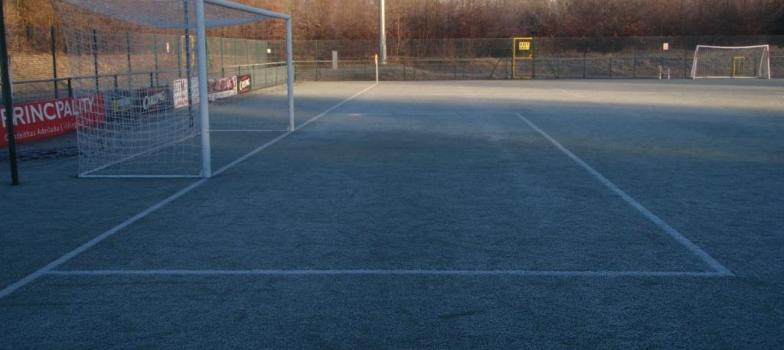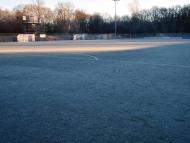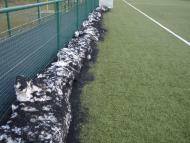This time of year always sees an increase in the number of calls we receive for repairs to artificial pitches. The first sign of frost and any weaknesses in the seams of a surface are exposed as the water expands and in effect ‘blows’ open the joints.
Nick Harris, Sales Manager
Want to know more?
For advice on getting your artificial sports pitch through the winter months, call Technical Surfaces on 08702 400 700 and ask to speak to a Technical Manager
A common misconception with artificial sports pitches is that they are ‘all-weather’, so much so that they are often referred to as just the ‘All Weather Pitch’.
If maintained correctly, an astroturf pitch should be playable in most weathers, but it is a mistake to assume that such surfaces are ‘all-weather’, as grounds staff will no doubt have discovered when heavy snowfall hit the UK almost 12 months ago.
During winter, artificial pitches retain a large moisture content, which will inevitably freeze, causing the surface to become hard and unsafe to play on. It is not uncommon for the pitch to remain frozen even when surrounding natural grass areas have thawed, due to the low core temperature of the astroturf and the insulating effect that the infill and carpet creates. Reduced daylight hours can also result in shaded areas remaining ‘frosted over’ all day, impacting upon the ability to thoroughly sweep or brush the pitch.
This situation can be compounded further by snowfall, which will quickly settle on a frozen pitch. Last winter, many artificial pitches were forced to close for two or more weeks due to heavy snowfall: unfortunately, once the snow has settled it is very difficult to move, particularly if it has been left for a day or more. If it can be moved then there is also the problem of where to stockpile the snow until it melts. If you do consider clearing snow from your pitch, it is vital that this is done when the snow first falls; if allowed to thaw and re freeze it will be almost impossible to remove the ice without damaging the surface, as it will stick to the carpet.
Whilst snow presents its own unique problems with little that can be done, a frozen or frosty pitch can often be prevented by applying a specialist PDV (pure dried vacuum) salt to the surface. Such a product has few impurities so is less likely to cause damage or contamination to the pitch. Other products such as rock salt, grit or chemical-based solutions should be avoided at all costs, as once dissolved they could cause contamination and damage to the playing surface.
The PDV salt should be considered as a preventative anti-freeze application rather than a de-icer. It is estimated that an initial treatment of approximately 1 tonne of salt for a full-size surface or 125kgs for a five-a-side kickabout facility will provide a sufficient protection during a few days of cold weather, although this will depend on the intensity of any rainfall, frosts and snow that may occur.
While there are processes designed specifically to combat the effects of a cold, damp climate on the playability of artificial sports pitches, maintenance should not be treated as a once-a-year requirement; the vast majority of procedures can – and should – be completed all year round, enabling you to provide a consistent playing surface from January through to December. Indeed, if greater emphasis is placed on preventative maintenance while weather conditions are more forgiving, you may just find that less corrective work is required when the winter cold creeps in.



